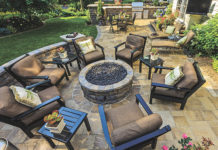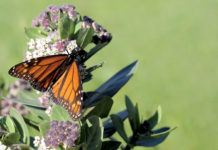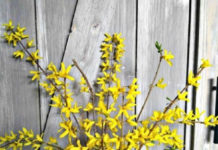By Lynne Royce
It’s a beautiful day. The sun is shining and gentle clouds roll by. Your heart yearns to go down to the shore to walk along the ocean’s edge and feel the waves gently lap at your feet. But you have to mow the blasted lawn.
Or you’re looking at your budget trying to find ways to cut costs to send the kids to soccer camp or take that planned family vacation. Do you really have to pay a lawn crew to mow and maintain your lawn?
One option, said John Black, president of the Native Plant Society of New Jersey, is to get rid of that lawn and fill it with native plants which are better for the environment, conserve water, attract birds and butterflies and save you money.
“Environmentally speaking, lawns are a barren wasteland full of toxins. Aesthetically speaking they are boring to look at with no texture or form,” Black said. “There is a better way that will save time and money as well as natural resources. The plot of land where your house sits was most likely a beautiful forested area with a myriad of shapes and colors.”
Black is a master naturalist and certified interpretive guide and member of the Arachnological Society. He has sat on the board of directors of the Atlantic Audubon Society and worked extensively with the U.S. Fish and Wildlife Service and has the statistics to prove lawns waste water, money and time: In this country, homeowners collectively use 7 billion gallons of water per day to water lawns, spend $35 billion each year on lawn care and, on average, spend about 70 hours each year on lawn maintenance. Lawn mowers also account for at least 5 percent of country’s pollution.
Black and his family have done their part by getting rid of the lawn and non-native plants on their half acre of property at the top of the Pine Barrens in Browns Mills, Burlington County.
“The first year I removed all the plants that did not belong here and just stopped mowing,” Black said. “In some areas I covered the ground with black plastic. I then started replacing the plants with regions in my yard ranging from dry and sunny to semi-shade and damp. Once I started to restore the native plants that should be here, other native plants, some rarely seen, started to grow on their own. That was the magic of all of this. I simply restored the conditions that should be here and the (native) plants that were once here started to come back.”
Black said he and other members of the Native Plant Society of New Jersey are seeing a trend in the appreciation of native plants over lawns in New Jersey.
“It is hard to say what is the driving force behind the increased acceptance of using native plants for landscaping,” Black said. “It could be more awareness of the dangers of chemical use by the homeowner. It could be the desire to spend less time cutting grass. It could be that homeowners are finally waking up to the fact that it is better for the environment.”
Red Bank-area residents with smaller pieces of property are showing an interest in converting lawns into garden patches, said Natale Siclare, the lifestyle and gardening expert at Sickles Market in Little Silver. “Those who live in smaller homes in Red Bank wonder, ‘Why drag out the lawn mower for this little piece of grass?’ ” Siclare said.
He has also noticed some interest in replacing lawns with rolls of artificial turf, a concept which horrified Black. The artificial turf movement started in California, Siclare said, because of the water shortage and water companies offering rebates to home owners who got rid of grass. He said artificial turf also appeals to some shore home owners who visit only on weekends and don’t want to mow lawns.
“Artificial turf is worse than regular turf grass,” Black said. “It is made from recycled tires and that is a good thing but the end product is not recyclable.”
“One of the things that has to be done when you put it down is that you have to scrape off the topsoil and then heavily compact the soil underneath. Soil compaction is a death knell for trees.”
So while there are alternatives to getting rid of rolling green lawns, not all of the options are environmentally friendly.
“I think the bottom line is that we just have to get away from this ridiculous at green aesthetic,” Black said, the idea that “somehow having a pool table for your yard is desirable over texture and color.”
Black will discuss native plants and be available for questions during his “Alternative to Lawns” talk for the Shrewsbury Garden Club, 7 p.m. April 16 at the Monmouth County Library Eastern Branch, Route 35, Shrewsbury. The meeting is free and open to the public with refreshments at 6:30 p.m.














